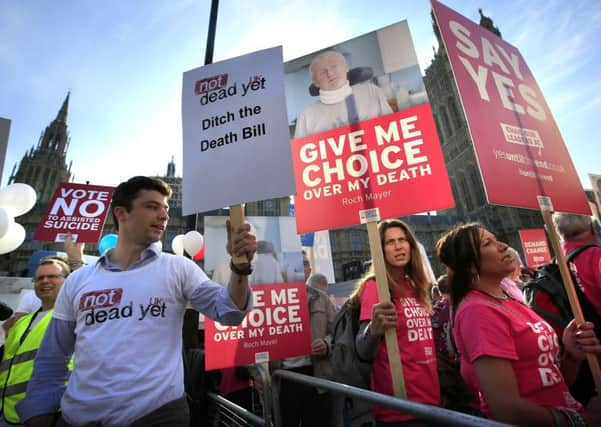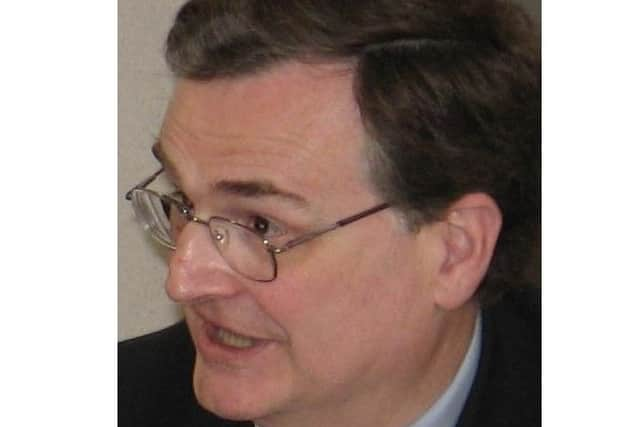Canon Ian Ellis: ‘Many of the dilemmas in end-of-life care have remained very real for me, even after much thought’


The term ‘assisted dying’ is not a legal term but is often taken to refer to helping a terminally ill person, in the final stages of illness, to determine the manner and timing of their death, whereas ‘assisted suicide’, which is a legal term, refers to such assistance whether or not a person is terminally ill.
RCP president Professor Andrew Goddard points out the current exercise is necessary because the college is frequently asked for its stance on the matter of assisted dying and because what it says may be cited in legal cases and in parliamentary debate.
Advertisement
Hide AdAdvertisement
Hide AdTherefore, he says, “it is essential that we base this on an up-to-date understanding of our members’ and fellows’ views”.


Following its poll, the RCP says it will adopt a “neutral” position until sixty per cent of respondents say that it should be in favour of or opposed to a change in the law (this figure was initially indicated by the college as two-thirds, but subsequently was changed).
However, the Christian Medical Fellowship says it is strongly urging the RCP to abandon its “biased” poll. The CMF’s head of public policy, Philippa Taylor, points out that even if 59 per cent are in opposition, the RCP would “go neutral”.
By contrast, supporting the concept of assisted dying, Raymond Tallis, Emeritus Professor of geriatric medicine at the University of Manchester and an elected member of council at the RCP, writes: “There is a small, but significant number of dying people who experience unbearable suffering that cannot be relieved by even the best palliative care, who want the choice of an assisted death.”
Advertisement
Hide AdAdvertisement
Hide AdHe adds that public support for an assisted dying law remains consistently high at around 80%, as confirmed by the British Social Attitudes survey in 2017.
As far as the current law in Northern Ireland is concerned, the RCP indicates that the Criminal Justice Act (Northern Ireland) 1966 makes it an offence “to encourage or assist the suicide of another person”.
Dame Cicely Saunders, who was born one hundred years ago last year, is recognised as the founder of the modern hospice movement.
Perhaps her most quotable quote is: “You matter because you are you, and you matter to the end of your life. We will do all we can not only to help you die peacefully, but also to live until you die.”
Advertisement
Hide AdAdvertisement
Hide AdCertainly, Dame Cicely was driven in her commitment to palliative care and her efforts have resulted in an immense comfort to countless patients and their families and friends.
An Anglican nurse, this drivenness was no doubt sustained by her Christian faith.
Anyone who has visited a relative or friend in a hospice will very probably have been deeply impressed by the loving care of staff and the calm ethos of the institution. It is deeply reassuring to know that as people pass their final days they are surrounded by professionals who want them to live those days well and in as much comfort as is possible.
An invitation I took up some months ago to participate in a two-day end-of-life care symposium at Dublin City University with an international line-up of distinguished speakers, presented an opportunity to think through many related issues.
Advertisement
Hide AdAdvertisement
Hide AdProfessor Philip Larkin, of University College Dublin, stressed that compassion is based on action and is not just a feeling. The hospice movement is therefore compassionate in the true sense – it is based on action.
It was striking how he referred to the parable of the Good Samaritan as an archetype of compassion and pointed to how sacred art depicts the Samaritan lifting the victim in his arms, covering him with his cloak.
The importance of physical embrace of the suffering is illustrated in the derivation of the very word ‘palliative’, from the Latin palliare, to cloak.
Professor Anne-Marie Duguet, of Paul Sabatier University, Toulouse, outlined the differing laws on end-of-life care in the European Union but, at a more general level, stressed the dignity and autonomy of patients.
Advertisement
Hide AdAdvertisement
Hide AdWith much emphasis on the autonomy of the patient, questions arise about precisely what laws allow and do not allow – which brings us into such areas as the use of banned drugs, distinguishing where the line between normal and extraordinary treatment lies, the potential for conflicting opinions about care regimes among family members, and of course the highly controversial topic of assisted dying when a patient finds it so hard to face the kind of death that lies ahead.
In 2014 former Archbishop of Canterbury Lord Carey caused some stir when he voiced his support for the Assisted Dying Bill, which was later rejected in the House of Commons.
Many of the dilemmas in end-of-life care have remained very real for me, even after the hard thinking at the symposium. I just remain thankful for the care and the support that I always see when I visit in hospices.
As Dame Cicely Saunders also said, a hospice is about the quality of life remaining, coming somewhere between a hospital and a patient’s own home.
Advertisement
Hide AdAdvertisement
Hide AdIndeed, Professor Pierre Mallia, of the University of Malta, spoke to me on the sidelines of the symposium of how he would like to see many more local hospices.
Assisted dying does involve an action, the primary intention of which is to end a life.
It may seem to be splitting hairs to say that this is very different from a primary intention of relieving pain or discomfort, but the distinction is surely important from a moral point of view.
• Canon Ian Ellis is a former editor of The Church of Ireland Gazette